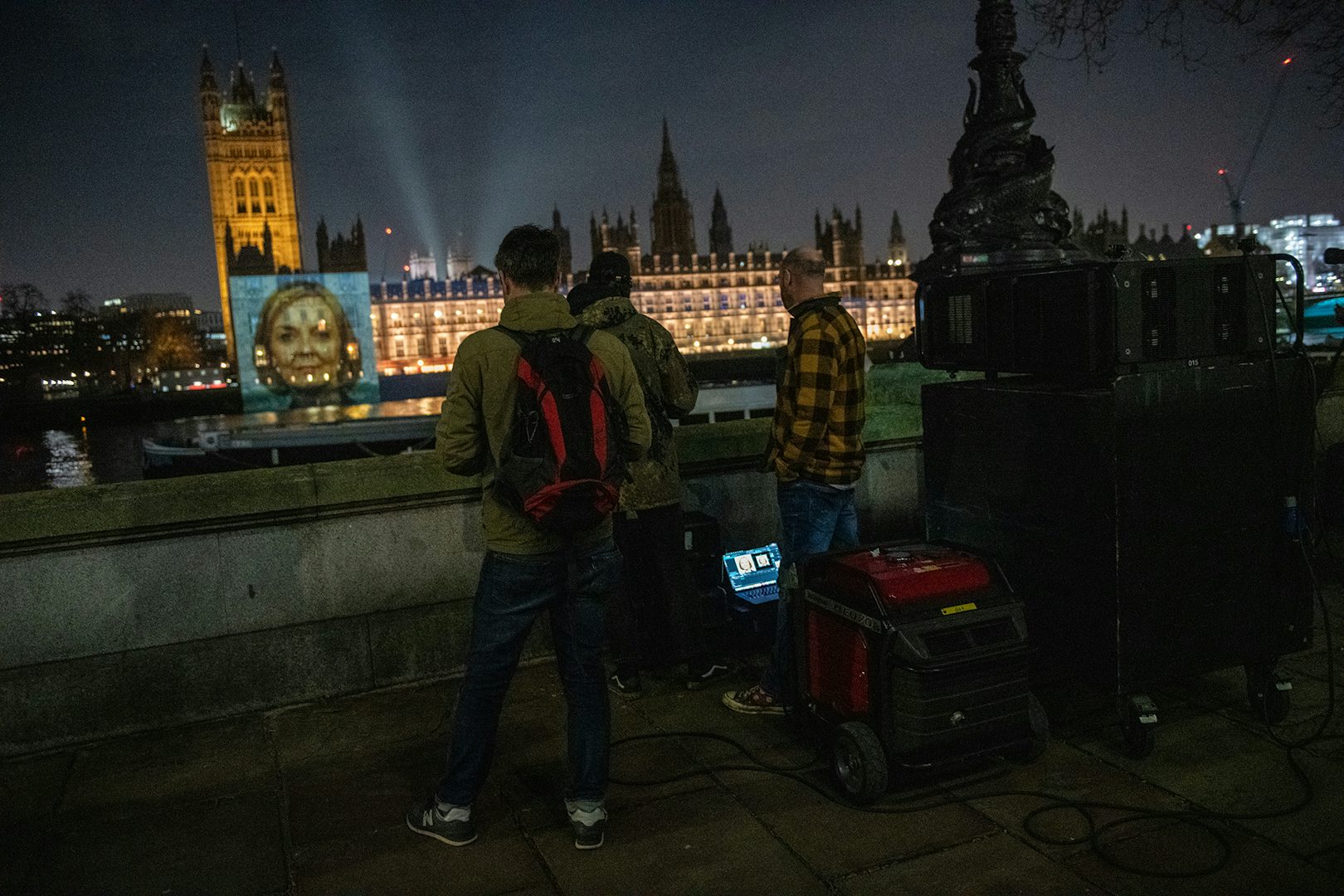“If you had said … Boris Johnson will become Prime Minister; there’s a pandemic, and he passes these strenuous laws that mean people can’t leave their houses, but the address that receives the most fines in the country is 10 Downing Street; and he’s replaced by Liz Truss, the cheese woman who crashed the economy, who is outlasted by lettuce. Even I would have said: I find that implausible.”
Ben Stewart of the activism group Led By Donkeys is reflecting on the chaos that has ensued in UK politics since they plastered a badly aged quote from David Cameron onto a billboard in Stoke Newington in London after Brexit had torn the UK in two.
With no awareness that the 24-hour news cycle would soon make the satirical comedy The Thick of It seem unimaginative, the group (whose name is a play on the World War 1 phrase ‘Lions led by donkeys’) came into existence in 2018 with no grand plan to be an ongoing organisation; they just felt a sense of purpose to help the UK public grapple with the misinformation stemming from the messy Brexit negotiations.
“We were forever doom-scrolling through social media in despair at the lies, exaggerations and promises made by leading Brexiteers,” Oliver Knowles recalls. “We decided just to go out and hold these people to account, starting with David Cameron’s infamous Tweet from the 2015 general election discussing a choice between strong and stable government with him or chaos with Ed Miliband, which Ben and I turned into a billboard as an experiment.”

It was far from their first activism rodeo. Stewart and Knowles met in the late 90s due to their work protesting fox hunting. Ten years later, the pair scaled the Didcot Power Station as Greenpeace protestors, where they ran into Will Rose, a Greenpeace photographer. Rose consequently met James Sadri on a ship in the Gulf of Mexico in the wake of the Deepwater Horizon spill in 2010 before Sadri met Stewart as they swam to disrupt offshore drilling in the North Sea.
While they met campaigning with Greenpeace, Sadri says Led By Donkeys isn’t a campaigning project, per se. “It’s more … there are issues that we think society should be talking about. We like to create an intervention around an issue that invites deeper reflection on something and can create what might be termed a social object that can be passed around and be used to root a conversation that we think people should be having in the pub or their workplaces.”
There are issues that we think society should be talking about. We like to create an intervention around an issue that invites deeper reflection
Led By Donkeys soon found society was eager to talk. “As we descended from the ladder, people stopped their cars and tooted. Laughing, with their thumbs up,” Knowles recalls as they realised there was something in pulling content out of the digital ether and putting it back in the public realm where people can reappraise the words and get the political reality. “There’s a bit of luck to Led By Donkeys,” he reflects. “If we set up Led By Donkeys tomorrow, it might be different. We were just there at the right moment. There was a huge amount of energy, anger and frustration with where our politics had got.”
After posting the billboard on social media (it didn’t take long to be torn down), Stewart says: “Suddenly, we had many followers on the social media accounts we’d only just set up. We slowly felt our way into it, playing with projections and land art. Suddenly, we found ourselves in a field with a tractor ploughing a huge message that could only be seen from a helicopter.”

The team initially worked anonymously yet failed to coordinate over their pseudonyms: “Two of us were called Chris … we couldn’t even choose four different names.” The fun undercover missions had to end when the Lobbying Act ruled that Led By Donkeys needed to state who they were in the run-up to the 2019 General Election. “It was great being anonymous. I loved it,” reflects Stewart. “Part of me wishes we still were.”
Financially backed by crowdfunding, unlike in their work with Greenpeace, which involved a lot of admin and meetings, the team found with Led By Donkeys they could prioritise the creative process. “We could spend two days going for a walk together discussing the nut we wanted to crack and how we were going to do it,” explains Stewart. “That allowed the process to breathe. You get a little germ of something, develop it and give it time.”
Sadri likes to call the next phase the tyranny of the idea. “It is the manifestation of what we’re trying to deliver. We’ve cracked the nut, essentially, and the dynamic shifts into another space. This is the idea we all collectively know has to happen, even if it’s logistically difficult to pull off. That’s irrelevant because we’re in the service of this idea, and we know we must do it. It happened with painting the Ukrainian flag on the road outside the Russian Embassy in London and with the Gaza Beach.”
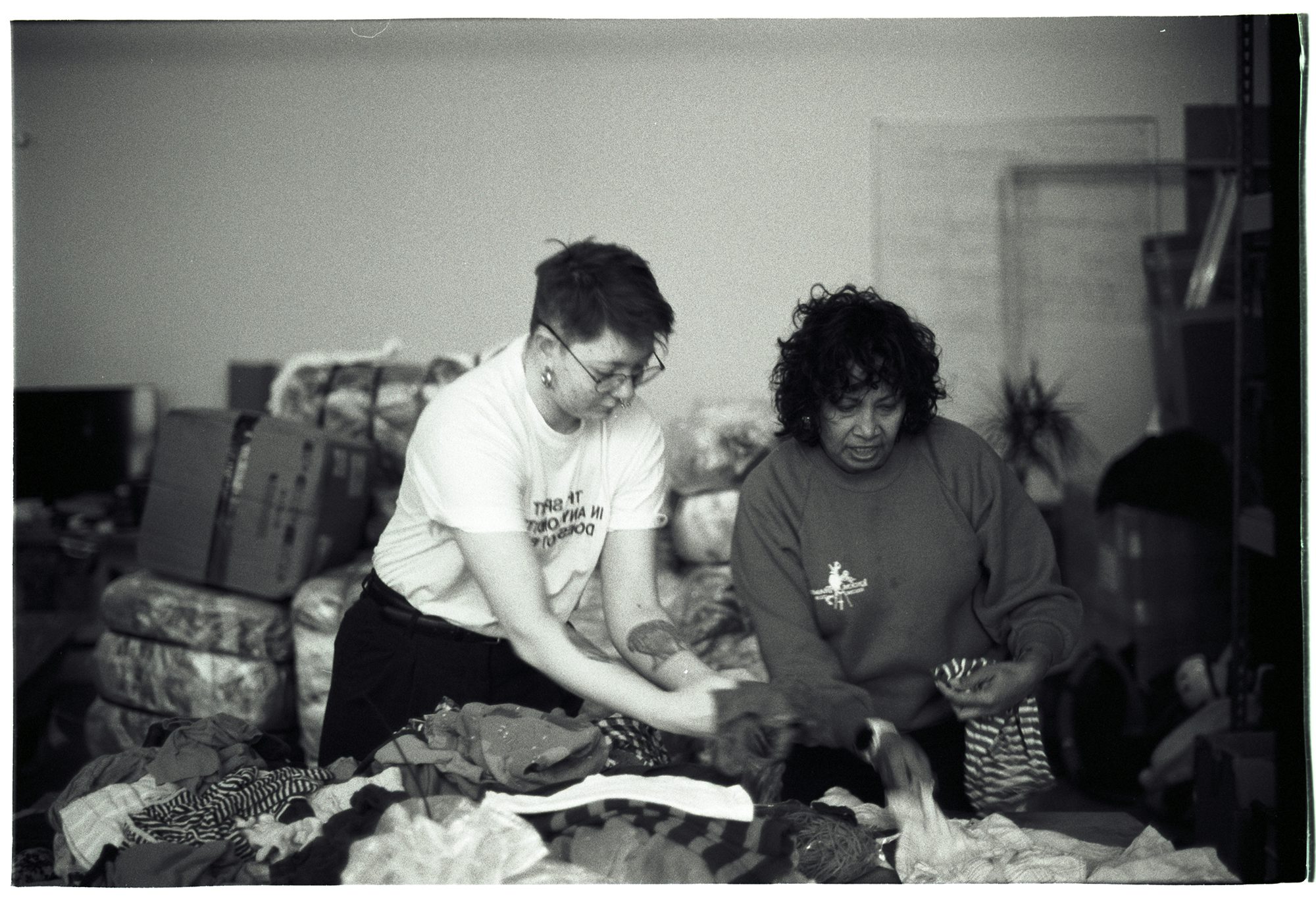

For the latter project, Sadri, who was born in Iran and spent time in Israel and Palestine in the 90s, wanted to find a way to visualise the thousands of children who had died in Gaza since October 7 in a way that showed the sheer loss of young life. “It took a long time to get there,” he recalls.
They then landed on the idea of laying children’s clothing on a beach. “It was immediate. We knew we had to do it,” Sadri recalls. “We revisited the beach with only a handful of days, 100 volunteers and a coach booked. We needed to source 55 tonnes of children’s clothing and then pair up the items because an 11-year-old and a one-year-old don’t have matching tops and bottoms. Having 100 volunteers in our warehouse for a week pairing up clothes was an immense logistical challenge.” It took a team of 80 people five hours to lay the clothes out on Bournemouth Beach.
We tend to generate ideas, but we’ve got a great network of collaborators we work with on different projects who help us pull these things together quickly
Given the sensitivity of the subject matter, Led By Donkeys worked with Palestinian partners on the concept all the way through. “We talked about, would this be sensitive? How would it feel? And actually, we had loads of really great feedback, and it was shared widely as an intervention. However, the most significant feedback was from Palestinians. One Palestinian friend said it was the first time they’ve felt so seen since the beginning of what’s happening in that area,” says Sadri.
Knowles agrees that working with partners and listening to others is important when handling certain interventions sensitively. “With the National Covid Memorial Wall, we worked with Covid-19 Bereaved Families for Justice,” he recalls. “Working closely with the founders and other members of their community was instrumental in how we approached developing the idea for the wall. But to hear their stories and be in tune with their grief and lived experience was essential to landing a successful project.”
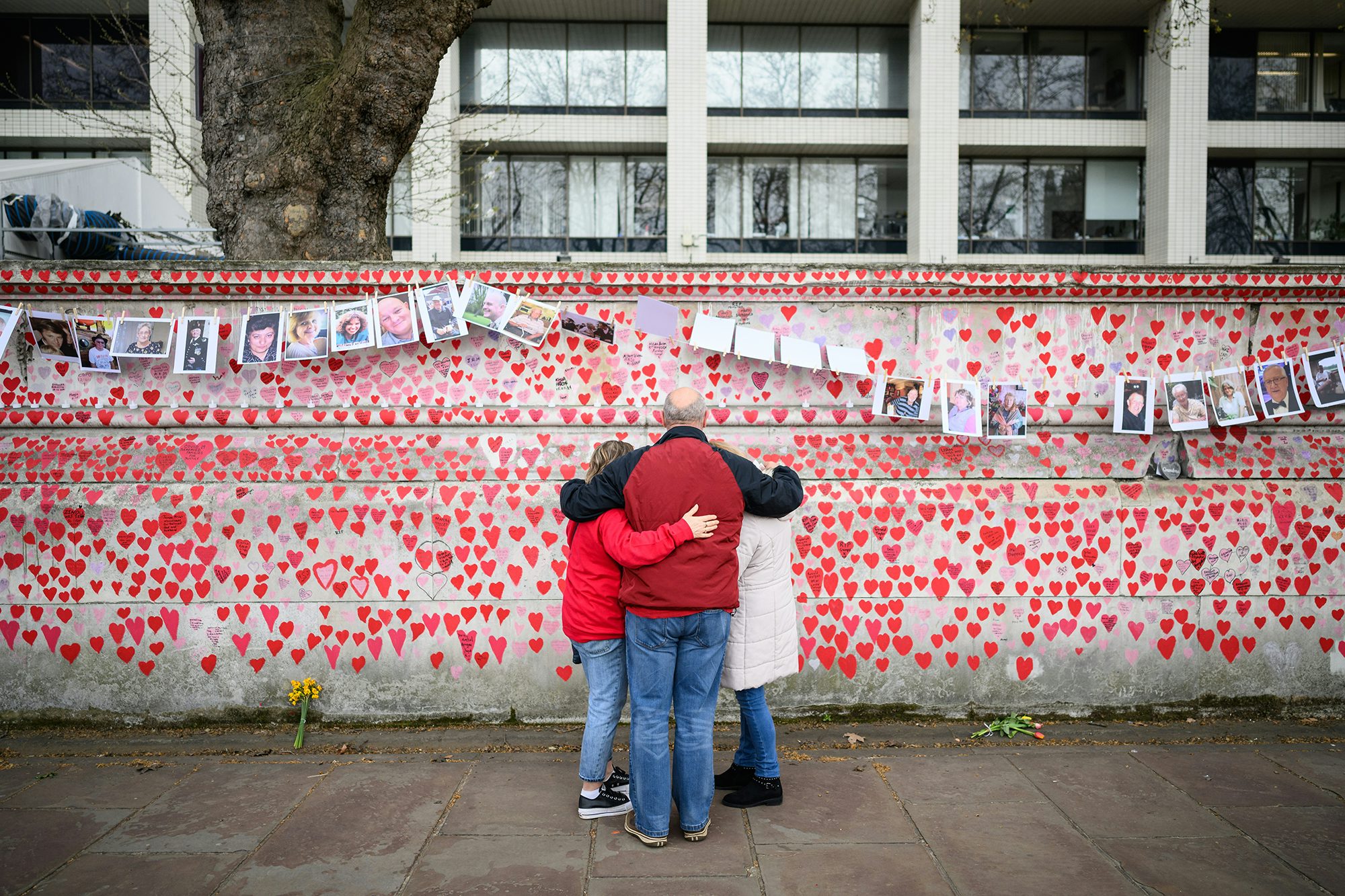

Whether it’s projecting an image of Boris Johnson onto Buckingham Palace hours before he arrived to be invited by the late Queen to form a government or painting ‘We Stand With the NHS’ on the lawn outside Glastonbury’s Pyramid Stage, Led By Donkeys often have to work fast. “It’s worth saying it’s not just four of us,” explains Knowles. “We tend to generate ideas, but we’ve got a great network of collaborators we work with on different projects – videographers, editors and logistics experts who help us pull these things together quickly. People who say yes to stuff and make things happen.”
“You only see the stuff we get out in time,” adds Stewart. “There are a whole bunch of projects, scripts and interventions that we’re working on, and suddenly, we’ve missed the moment, and it just goes onto the cutting room floor.” Recalling a failed Glastonbury stunt, Knowles says: “I’d hate you to labour under the impression that we only have good ideas – we have some terrible ideas as well. And there’s been some close calls. We had an idea for a banner at Glastonbury that we would pull out in front of a big band because we thought it would be a great intervention. We called it off some hours before because we realised how packed it is and how utterly disinterested people would be in that political issue at that moment.”
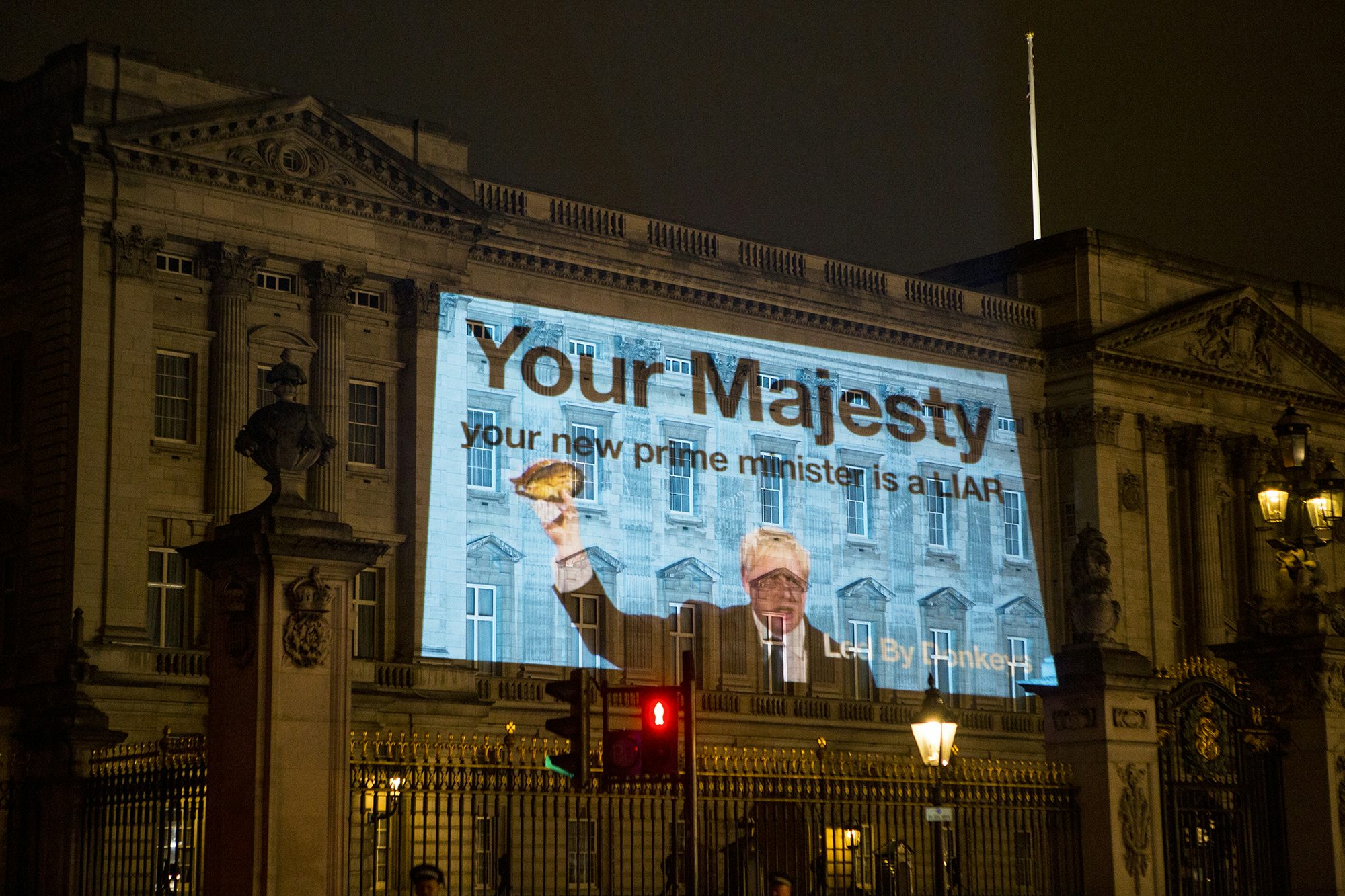
Led By Donkeys never forget to make people laugh (particularly at far-right MPs). Liz Truss was left red-faced when a banner that read, ‘I crashed the economy’, next to a goggly-eyed lettuce unfurled behind her as she spoke at Beccles Public Hall about her support for Donald Trump, while Nigel Farage lost his cool when his Reform election speech was disrupted by a banner featuring Russian President Vladimir Putin and the words ‘I heart Nigel’.
“It pricked his pomposity,” Stewart explains. “It induced him to show more of his personality, which he keeps hidden – his tetchy, short temper. It was cathartic. An effective tool against far-right figures is to laugh at them.”
Knowles adds: “We’re not sat around on a Monday morning trying to cook up ways to make people laugh. That’s not what drives us. But we’ve come to understand as campaigners that using humour at the right moment is a great way to connect with people.”
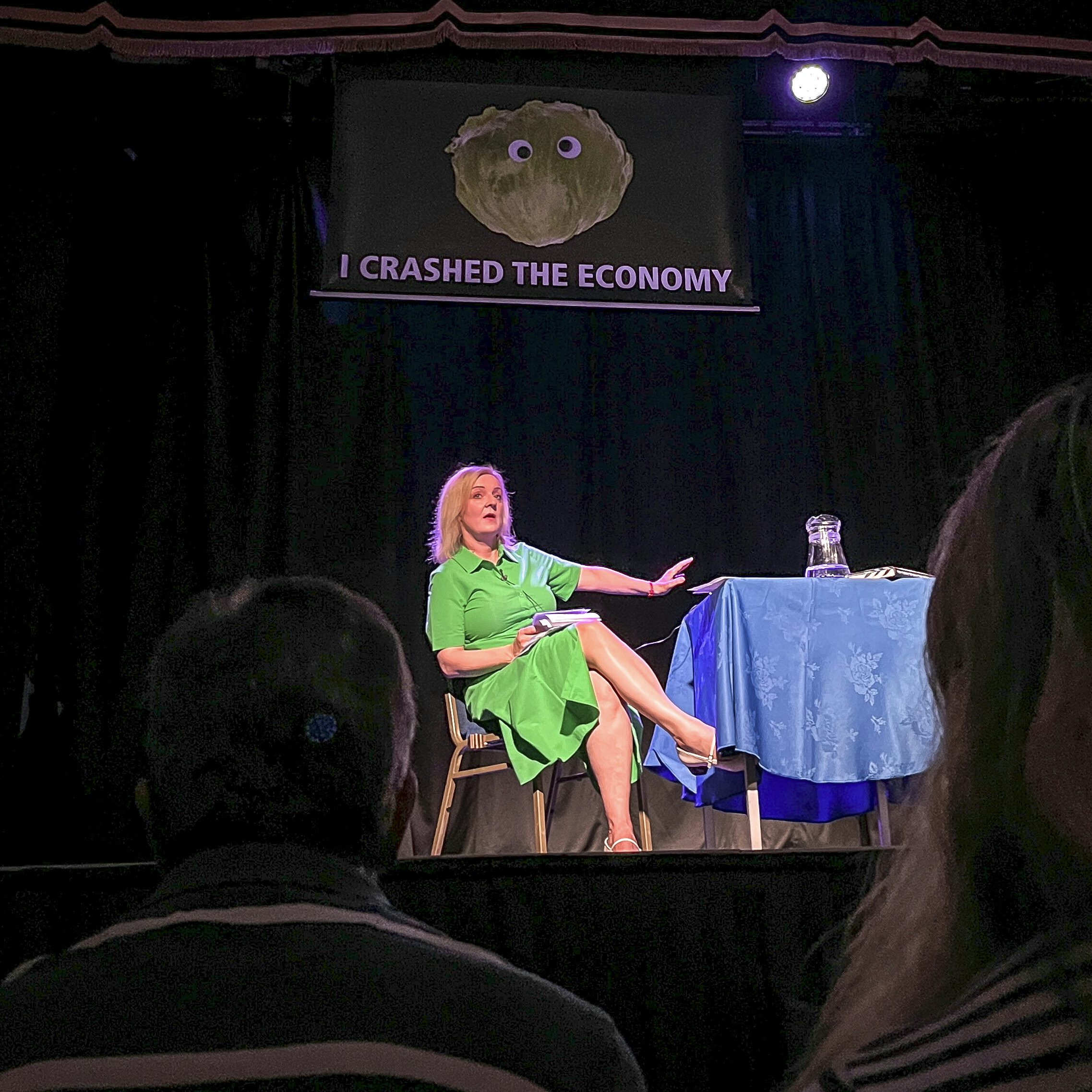
Most people in the UK have reached a point over the past five years where the news cycle is so doom-and-gloom they’ve had to shut it off, but as a guerrilla journalism operation, staying glued to current affairs is part of Led By Donkeys’ package. Knowles admits it does come at a cost. “We’ve all felt it. There are times we feel absolutely saturated with it and want to shut it down,” he says. “But we take care to have holidays we call ‘deep off-duty’ where the laptop is properly closed.”
Led By Donkeys has now reached a brief window of calm via a changing government. This is also a period of reflection aided by a new book and the group’s first exhibition. “Everything has moved so quickly I hadn’t got a sense of scale until I looked through this big chunky book,” Sadri says of their newly-publish compendium by Thames & Hudson, which prompted a last-minute exhibition of their work in Bristol.
There’s a bit of luck to Led By Donkeys. We were just there at the right moment. There was a huge amount of energy, anger and frustration with where our politics had got
“For so much of this project, while installations are often in the real world, few people have participated – the National Covid Memorial Wall and Gaza Beach are an exception,” reflects Sadri. “We mostly work in the middle of the night when people aren’t around and then share it online. It’s hard to feel a public reaction. When you get real people coming to a physical space, you’re reminded that there really is a huge appetite for this stuff.”
“A big part of the exhibition is dedicated to the National Covid Memorial Wall,” continues Stewart. “I spoke to a guy who explained how much the wall had meant to him because his grandfather had died when Matt Hancock released people with Covid back into care homes. He understood the wall was an act of accountability. It wasn’t just a memorial; it was pointing a finger over the Thames to Boris Johnson, saying you must answer your failings.”
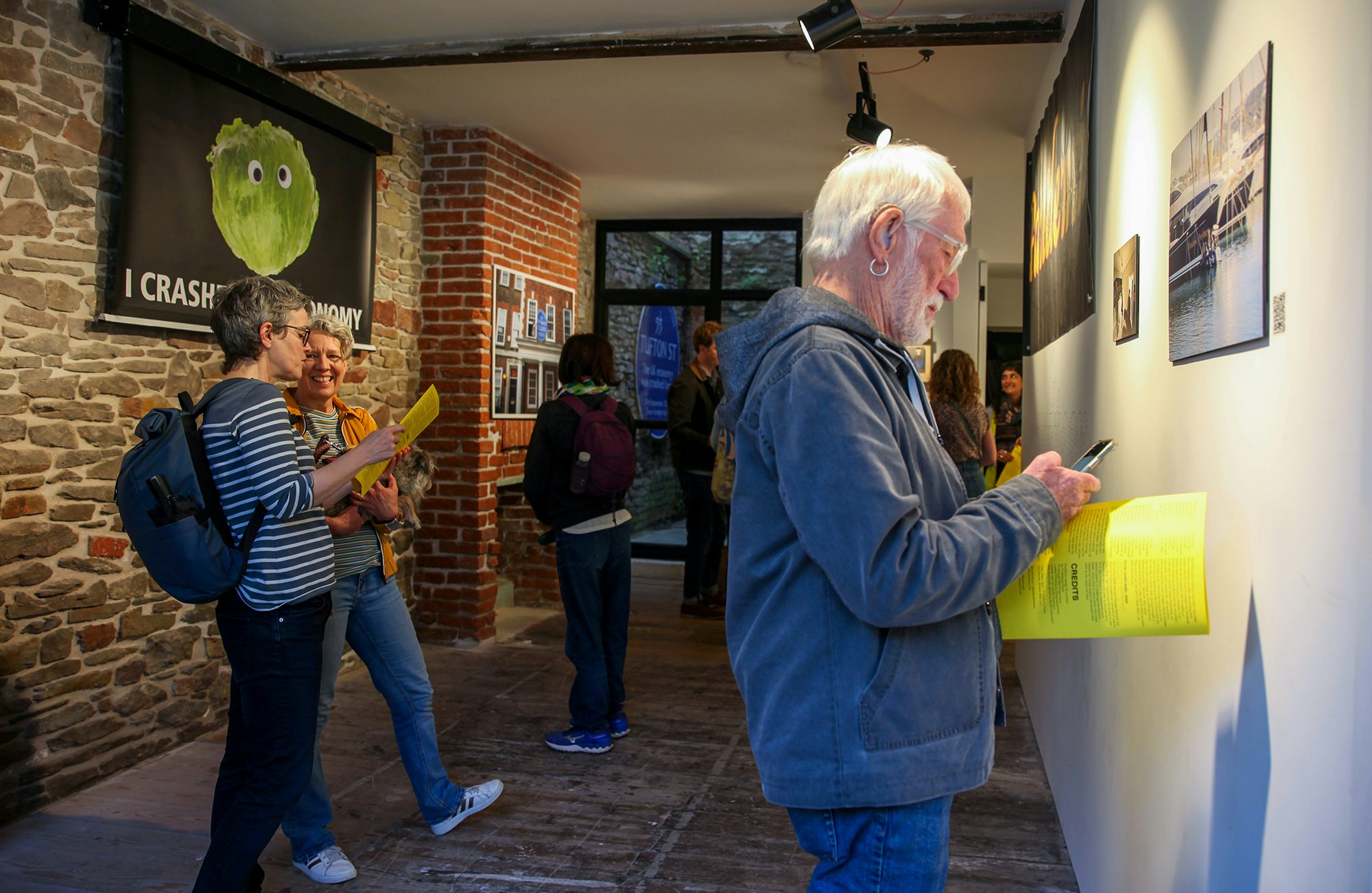
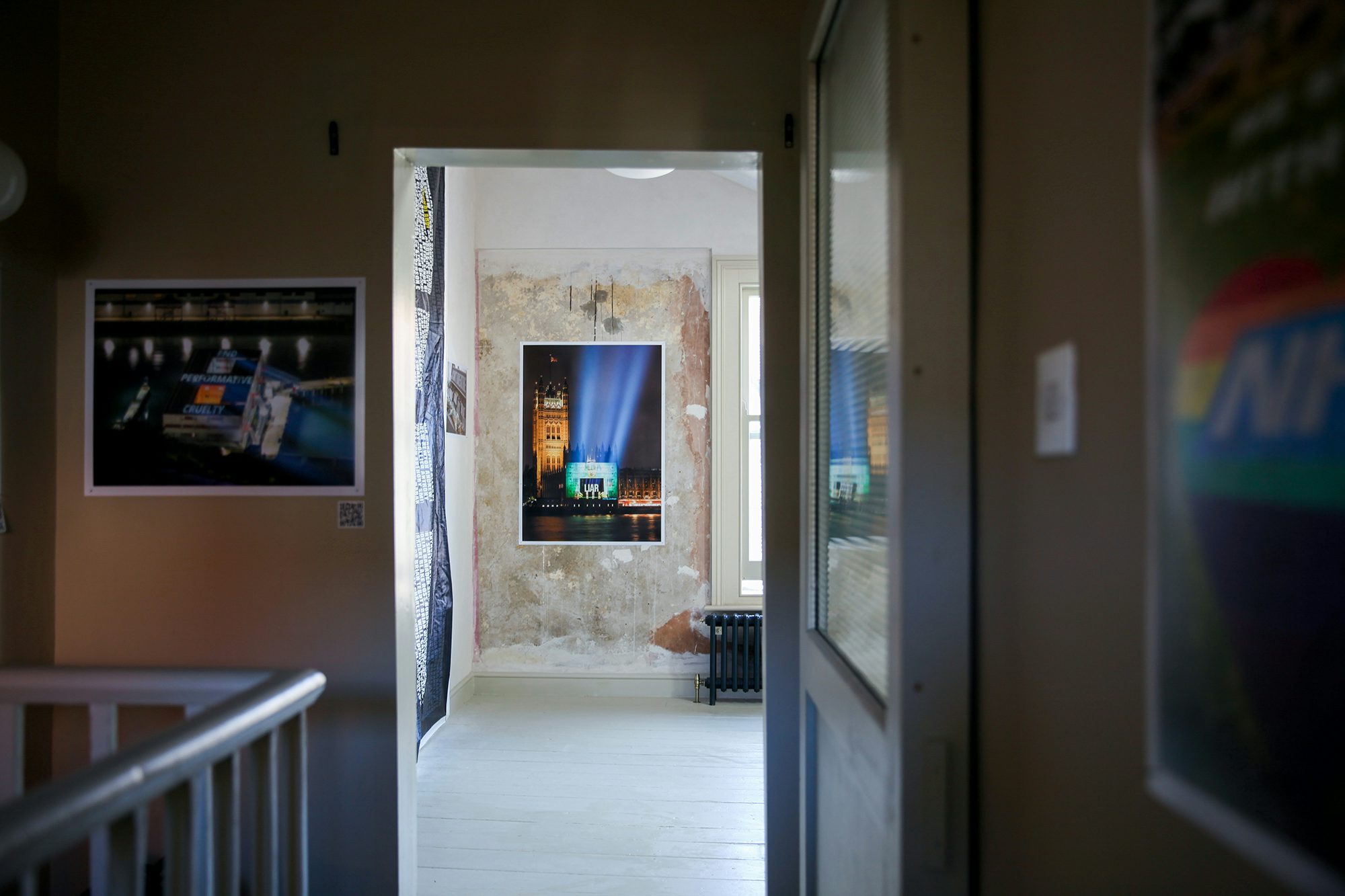
Despite the recent political changes in the UK, Led By Donkeys haven’t run out of ideas and have no plans to slow down. “The world doesn’t end at Dover. I am highly motivated by the invasion of Ukraine, which is an imperialist, colonialist project by Putin. I feel highly motivated around Gaza. Look at what’s happening across the pond in America. Look at climate, a global issue that needs to be told globally,” says Stewart. “I just hope I get more sleep compared to the last five years.”
Knowles admits there will be work to be done on this Labour government, and there is work to do now on the far-right. “The presence of Nigel Farage and the right wing. They’re not going anywhere,” he reflects. “It would be good to use Led By Donkeys not just as a vehicle for critiquing what our government is doing, but using the platform to push forward new and exciting progressive ideas.”
“Led By Donkeys has always been about confronting people in power, and that’s why it doesn’t necessarily shift from this party in power to that party in power,” concludes Sadri. “We take a much looser view where that is exerted and whatever is exercised. It’s about a national conversation around who we are and contributing to that to hopefully steer us in some way away from this horrible nationalist, xenophobic surge that was behind Brexit and is still driving the horrific racist riots that we’ve seen over the summer.”

Led By Donkeys: Adventures in Art, Activism and Accountability is published by Thames & Hudson; thamesandhudson.com; ledbydonkeys.org
